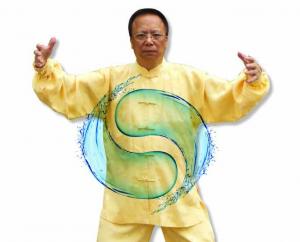
The ancient self-healing Chinese art of qigong (Chinese breathing exercise) is set to scale new heights as health awareness intensifies in HK and on the mainland. Renowned HK tai chi qigong master, Yuen Chiu-kwan, is aiming to create medical wonders with an ambitious project to give cancer and heart patients a new lease of life.
"He went down hard on his knees thanking me as if I were a god, saying if not for me, there wouldn't be him," renowned tai chi, qigong master, Yuen Chiu-kwan, recalls. The words were spoken to Yuen by a patient dying of liver cancer.
That was way back in 2000, when Yuen heard about the 56-year-old patient by word of mouth. Yuen felt a "calling" to seek out this ailing man, to perform one of the most humane missions of his life.
"He was already on his death bed after having had one-third of his liver removed, and was given only a few months to live," says Yuen.
|
 |
| Photo provided to China Daily |
"I immediately applied five of the 18 tai chi qigong principles I had formulated, and taught him how to use them in exercises for 10 months. That man recovered after that and went on to live another four-and-a-half years before finally succumbing to his illness.
"Although the respite wasn't terribly long, it was enough time for him to do things he wouldn't have been able to do otherwise," Yuen says.
From an illegal immigrant to a registered Chinese medical practitioner, Yuen is a globally-recognized authority on tai chi qigong. Now in his mid-60s, he maintains a low profile in Hong Kong, despite his achievements.
Yuen, who is also a director of the World Society of Medical Qigong (WSMQG), claims to have attended Hong Kong celebrities, though he declined to name them. His string of accolades is long, arising from his deep-rooted ties with the WSMQG, which has been organizing regular international qigong symposiums on the mainland since its inception in 1989.
The history of qigong dates back as early as the Zhou and Han dynasties, when the art was taken up as a form of meditation to purify the body, mind and spirit.
The practice became popular with the founding of the People's Republic of China, and was thought to be therapeutic, holding the power to enhance the body's natural immunity against disease and to reduce stress.
Yuen calls qigong one of China's national treasures but, to this day, there's still no official definition for it. "The term was actually coined after 1949 by the mainland's first health minister, Li Dequan, and has been used ever since. Theoretically, it's a combination of aligning breath, movement, healing and meditation," he says.
Historically and, in theory, there are five established categories of qigong - medical, Taoist, Buddhist, Confucian and martial arts. The most widely practiced today is medical qigong, with an estimated 50 million practitioners worldwide, while the martial arts type is restrained, and appears to interest only the young and able-bodied.







